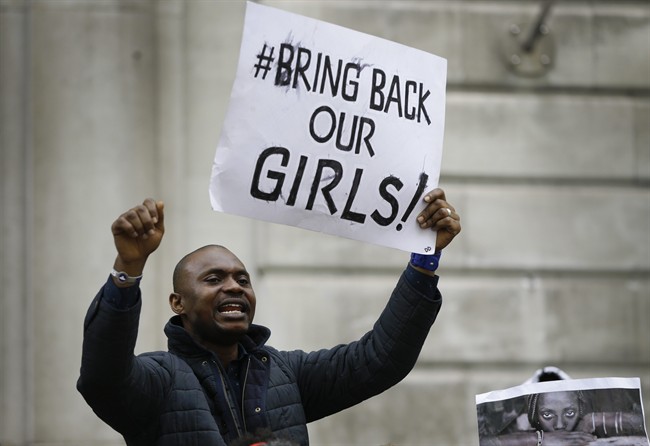BAUCHI, Nigeria – One of the teenagers who escaped from Islamic extremists who abducted more than 300 schoolgirls says the kidnapping was “too terrifying for words,” and she is now scared to go back to school.

Sarah Lawan, a 19-year-old science student, spoke out Sunday as Nigerians prayed for the safety of the 276 students still held captive. Their prayers were joined by Pope Francis.
Using the trending #BringBackOurGirls, the Roman Catholic leader tweeted: “Let us all join in prayer for the immediate release of the schoolgirls kidnapped in Nigeria.”
Lawan told The Associated Press that more of the girls could have escaped but that they were frightened by their captors’ threats to shoot them.
She spoke in the local Hausa language in a phone interview from Chibok, her home and the site of the mass abduction in northeast Nigeria. The failure to rescue those who remain captive four weeks later has attracted mounting national and international outrage. Last week, Nigeria was forced to accept international help in the search, after ignoring offers for weeks.
More experts are expected in Nigeria to help in the search, including U.S. hostage negotiators and others from Britain, France, China and Spain.
“I am pained that my other colleagues could not summon the courage to run away with me,” Lawan said. “Now I cry each time I come across their parents and see how they weep when they see me.”
Police say 53 students have escaped. Nigeria’s homegrown Boko Haram terrorist network is threatening to sell those who remain in captivity into slavery.
- Four injured after military horses break loose, stampede in London, U.K.
- Canada refused to repatriate woman from ISIS camp because she can’t be arrested: internal memo
- Russia vetoes UN resolution to prevent nuclear arms race in space
- Spain’s PM considers resigning amid wife’s legal probe: ‘Is it all worth it?’
In churches across the nation, Nigerians prayed for the girls, whose plight has brought together ordinary people in a year that had seen growing dissension between Muslims and Christians, disagreements exacerbated by the increasingly deadly attacks of the Boko Haram terrorist network. Africa’s most populous nation of 170 million has almost equal numbers of Christians and Muslims.
The Rev. Stephen Omale prayed at a church in Abuja, the Nigerian capital, for God to visit a change of heart of the girls’ abductors.
“Wherever they are, God will bring them out in his own mercy, he will see that they are brought out safely, without harm and also that this act will bring an end to all those who are perpetrating these acts,” he told congregants.
The Nigerian capital in the centre of the country that last month suffered two bomb blasts claimed by Boko Haram that killed about 100 people and wounded more than 200.
Britain, Nigeria’s former colonizer, has said it hopes to help not just in rescuing the girls but in the wider conflict to halt the 5-year-old Islamic uprising in which thousands of Muslims and Christians have been killed and some 750,000 people driven from their homes.
A Nigerian security expert warned meanwhile that the militants may have laid land mines to discourage any pursuit, and said strategists may be considering starving them out.
“They may have laid land mines, one cannot rule that out,” formed Nigerian Air Force Commodore Darlington Abdullah said on Sky TV. And “even as they go along abducting children, they are also going after food, grabbing food,” Abdullah said, suggesting that starvation might force the extremists to abandon the girls.
Also Sunday, a leading Nigerian rights group demanded the U.N. Security Council impose sanctions on Boko Haram, saying expressions of concern and condemnation are not enough.
“The future of these missing schoolgirls hangs in a balance. The council should not leave them to fend for themselves,” executive director Adetokunbo Mumuni of the Socio-Economic Rights and Accountability Project said in a statement.
He said targeted sanctions would send a strong message.
The United States already has designated Boko Haram a foreign terrorist organization, as has the European Union, making it illegal to contribute to the group. And Washington last year put a $7 million ransom on the head of Boko Haram leader Abubakar Shekau, who said in a video last week that he will sell the girls into slavery.
There also have been reports that some of the girls have been forced into marriage with their abductors, who paid a nominal bride price of $12, and that some have been carried across borders into Cameroon and Chad.
Lawan said other girls who escaped later have told her that the abductors spoke of their plans to marry them.
She said the thought of going back to school terrifies her – either the burned out ruins of Chibok Government Girls Secondary School or any other school.
“I am really scared to go back there; but I have no option if I am asked to go because I need to finish my final year exams which were stopped half way through,” she said.
Faul reported from Lagos, Nigeria. Associated Press writer Frances d’Emilio contributed to this report from the Vatican City.



Comments